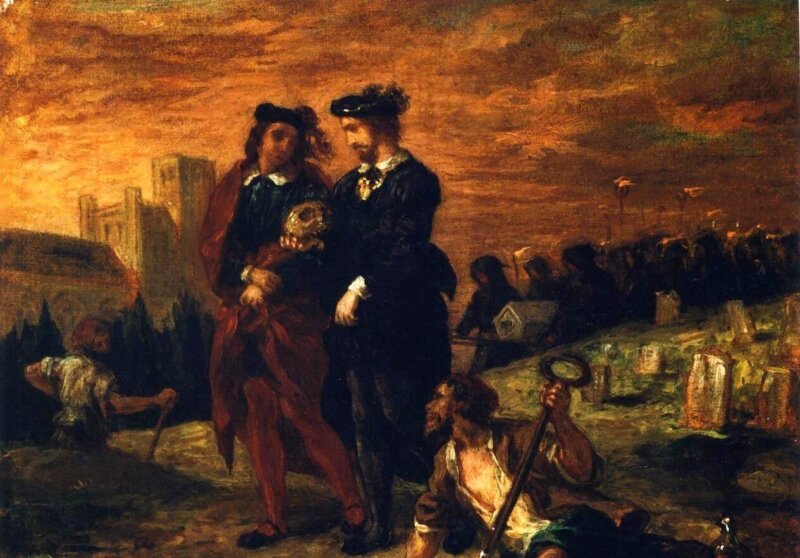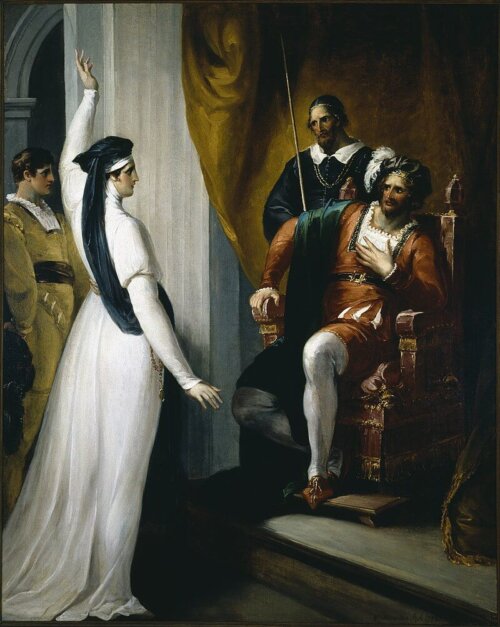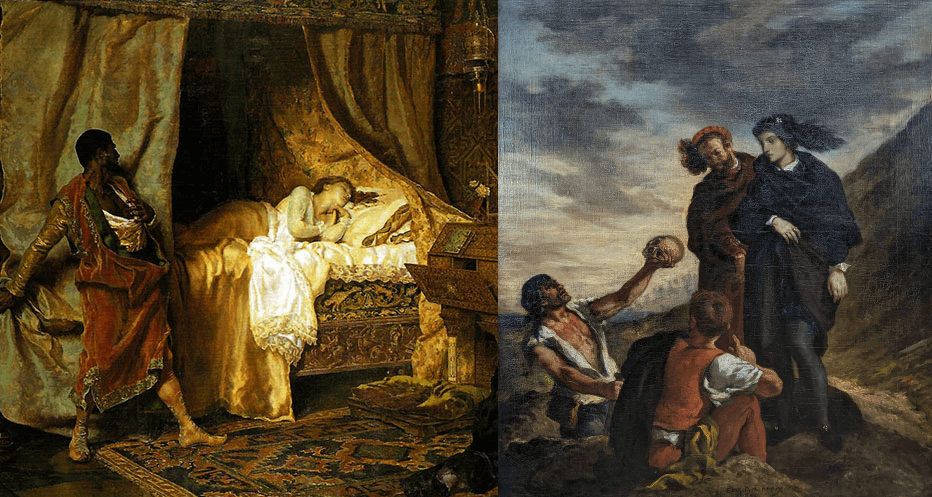The Problem of Meaning in Human Agency or Art

Does art mean anything? Let us be precise from the outset about terms. Art stands traditionally as a counterpart of nature.[1] When Shakespeare has Hamlet spell out the tension between “to be and not to be” he is inviting us to confront ourselves with the classical conflict between art and nature. “To be” stands for human agency in response to the apparent fatality of our birth or genesis—what we did not choose; what brought us here, wherever we might be. “Not to be” stands for nature or the absence of our “artful” response to fatality. Should we negate nature or be negated by it?
Art is then synonymous with human agency. Although the term “art” is traditionally conferred a privileged or noble sense tied to ends transcending the compulsions of everyday, ordinary life/agency: art is supposed to be what all agency is at its best. Modernity has come to demolish the traditional distinction in the name of a historical pluralistic system in which meaning does not depend upon transcendent ends, but upon immanent means.[2] Today, “In the Beginning” is not the Word but the Technique of Production. Why do one thing instead of another? Indeed, why be rather than “not to be”? Hamlet’s question, by today’s standards, is not a problem; the question is a non-question. For it makes no essential difference if we are or not, where being is defined by mechanical production or rather re-production. What does it mean to ask about the essential difference between acting and not acting? What does it matter for us to exercise any agency in pluralism’s mechanistic universe? The only serious answer admitted by pluralism is that we are here to express the glory of pluralism. But pluralism itself as an ideology seeks justification in “History” understood broadly as the arena of evolution that includes the phenomenon of man among many others. Pluralism presupposes a mechanistic conception of nature, telling us that human agency is meaningful only or strictly insofar as it reflects the mechanistic fiber of reality.
Of course, in a pluralistic world we can still ask why we should act, as opposed to not acting, but the Ought is now the function of a dialectic by which evolution makes use of human subjects as mouthpieces, even when these mouthpieces diverge from each other; even, nay especially, when our “ideals” contradict each other. Let us all brainstorm possible ends serving as carrot-incentives for us to serve a pluralistic System as the consummate Regime!
Shakespeare’s Hamlet does not merely ask whether we should be or not; he asks a more fundamental question; an ontological or properly philosophical/Platonic question that, yes, carries in its bosom an ethical problem, but addresses primarily the nature of reality. “To be or not to be” — what is the essential difference between the two poles? What is human agency/art and what is nature? In a derivative sense: how are we to understand the two? In any case, what are they? “The question” pertains to the disparity between the two poles, but the disparity evokes at once its source: why is there a disparity in the first place? We are forced to turn to “art in itself” and “nature in itself” if only by discovering them on their battlefield, as they manifest themselves against each other, as antagonists. Why do we ask “the question?” Because we are lovers of peace; because we reject chaos; because we cannot be sheep; because, as men, we must face the battle, the war between fundamental alternatives. How should we respond to the conflict? By facing it as a question. Questioning is not yet simply “to be”—to act, to fight—and it evidently is not merely “not to be” or to forsake being. Questioning stands in the middle by way of returning to the beginning of the conflict; the unity presupposed by the disparity, the separation.
Prince Hamlet is noble enough not to mistake “the question” as a contingent one open to choice. The fundamental question is not a blind fatality, either, for it stands at the crossroads between freedom and necessity. Indeed, in the question necessity converts into freedom: the question is the first choice. Not something open to choice, but “choice itself”—the very essence of choice. The question, therefore, draws art within the field of necessity, where human agency is a given, rather than a choice. That is why the prince does not ask us whether we might choose to be, rather than not to be. It is not “up to us” to decide whether we should be or not; why, it is not entirely up to us to choose to be, or not. Freedom is not something let loose (mechanically) by nature or truth. In poetic terms, we are called to freedom, to respond to necessity; and so, necessity itself is a problem for us. In freedom—in our human questioning—both freedom and necessity stand on the horizon of negation, or in the face of the abyss separating the two contradictory categories. Over the abyss both freedom and necessity arise as questions, or as facets of questioning, of the disclosure of truth. Is there a freedom, a “responding agency,” that is originally inherent in necessity? Is there, conversely, a necessity that, far from negating freedom, validates it, albeit not “deistically” as if freedom were merely unleashed, but ontologically, where necessity would constitute at once the Alpha and Omega of freedom itself? In sum, is there an original perfection of art, a divine art presupposed by all human art? Is nature itself or in itself—the truth about nature—the perfection of human art, a perfection that human art, as imitation of nature (imitatio naturae), recites/rehearses and thereby celebrates? Is human art the way divine art (nature) appears to us? Is human art human nature? Are we imperfect artists by nature or necessarily? Can we be perfect in our imperfection? Is there a right or perfect way to be human? Can we master our art, our being-human? What would it mean to be perfect as-human-beings? In biblical terms, it would mean “to be entirely devoted to God.” Yet the Socratic philosophical tradition does not depart from the biblical lesson: philosophy is a life of service to the God who supports the philosophical life; philosophy serves the true God, even where he is not revealed, or where he has no renowned legal representation.
What, then, does art mean? What does it tell us? This question cannot be answered seriously without considering both art and nature, or the ancestral conflict between the two. Yet, as we live out that conflict, as we live heroically as Prince Hamlet, we can come to realize that there is nature in art and art in nature, or that art and nature are both predicates of one and the same thought, mind, or consciousness, even though that single principle is at work one way in/as man and another in what stands beyond the reaches of our will. For in man, thought acts from without its subject-matter and in a gradual or mediated fashion (we want a posteriori, or on the basis of what is given to us to want), whereas in the physical universe or in all that is bodily, thought acts “from within” and with immediacy, which is to say that all that is prior to our willing it presupposes an immanent telos or principle of organization and so a meaning.
The meaning of our art would then presuppose the meaning of “art-in-itself,” of divine art, or of what we commonly call nature. But in what sense could God mean something, if not as we mean anything? If we mean something outside of our own will, the God of nature would mean something at once included in his will, namely the coincidence of being and thought, or the perfection of the will itself. But here is the catch, for upon reflection we can realize that what we want is precisely what God wants, namely the perfection of our will, which is to say that we want God’s own will, or that God’s will is what is immediate in our own. Insofar as we do not ultimately want what is outside of our volitional act, our will must be ultimately God’s own. What we really want is the conformity of thing and intellect that Medieval Latin scholarship would uphold as truth.
What does God mean, then? He means what we mean “immediately”; he means what things are in the mind, what things are as pure objects of thought. God wants what he contemplates, whereas we want what escapes our contemplation, what we fail to contain in our mind. We want what God wants or would want if he were somehow lost in the universe he wants immediately, or in himself. In sum, we want to rise to God; we want to rise from mere-will to the perfection of will in pure, substantive thought as opposed to thought as mere predicate. We want, in other words, to cross the passage from “my thought” to thought-in-itself and so from the discrepancy between thought and being to their original coincidence.
At the beginning of this essay, we asked the question, “what does art mean?” This question still lingers, but we can now address it univocally to include both art and nature. What art means is what nature means, even though we mean with effort, while God means effortlessly. Or rather, God wills effortlessly what he wills with effort in us. And in both cases, “the what” is one and the same: the identity of freedom and necessity.




